BestReviews is reader-supported and may earn an affiliate commission. Details
With more than 10 years’ experience writing about and testing products, I’ve become the friend that everyone asks for buying advice.
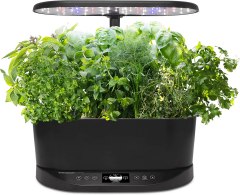
Take your indoor gardening to the next level with this LED hydroponics system that can grow up to 9 different plants at once.
Take your indoor gardening to the next level with this LED hydroponics system that can grow up to 9 different plants at once.
Combines an LED light (30W) with a hydroponics growing system. An LCD screen provides tips, telling you when to add water and nutrients and when to turn the light on and off. Pump is quiet. Great look. Efficient.
Considerably more expensive than other options.
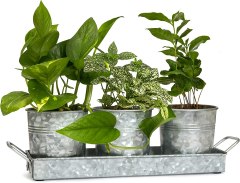
An inexpensive option for those who are into farmhouse decor, but be careful where you display it, as the bottom can leak.
An inexpensive option for those who are into farmhouse decor, but be careful where you display it, as the bottom can leak.
Nice rustic look for indoor or outdoor use. Constructed from galvanized steel. Rugged and weather-resistant. Comes with 3 pots and a 15.6-inch wide tray. Affordable. Protective pads on the bottom of the tray keep it in place.
Some found this option to be on the small side. Reports that the tray leaks.
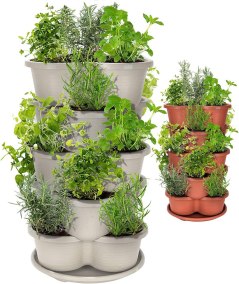
This sturdy stackable planter holds 15 plants in all and works much better as a standing solution than hanging.
This sturdy stackable planter holds 15 plants in all and works much better as a standing solution than hanging.
Five stackable polypropylene tiers capable of holding 15 plants in all. Indoor or outdoor use. Sturdy. Good use of space. Available in terracotta or off-white. Twenty-four inches high. Can also be used as a hanger. Works well for herbs, succulents, vegetables, and strawberries.
The chain that comes with it is not that strong; this option is better as a standing planter.
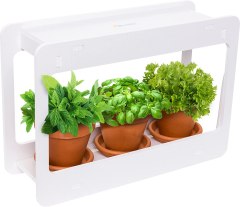
While on the small side, this option offers a nice design and an automatic timer, so you won't have to remember to turn it on and off.
While on the small side, this option offers a nice design and an automatic timer, so you won't have to remember to turn it on and off.
This garden features an 850-lumen, 4000k LED light. Light is on a 16-hours on, 8-hours off timer. Works well for herbs, vegetables, and flowers. Is 16.5" long, and 11.4" high. Efficient; light is the equivalent of a 14W bulb. Easy to assemble.
Does not come with seeds, plants, or pots. Some say the timer is a little erratic. On the small side.
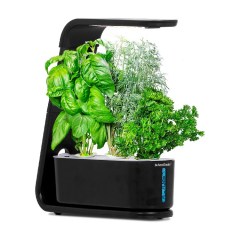
The kit includes room for 3 herbs with 10 inches of room for them to grow.
The kit includes room for 3 herbs with 10 inches of room for them to grow.
This modern indoor garden set uses 10-watt LED lights that were specifically designed to maximize its photosynthesizing. The set includes basil, parsley, and dill and a bottle of enough plant nutrients for 1 season of growth. The grower's neutral design should go with most kitchens.
The LED lights aren't replaceable when they go out.

We recommend these products based on an intensive research process that's designed to cut through the noise and find the top products in this space. Guided by experts, we spend hours looking into the factors that matter, to bring you these selections.
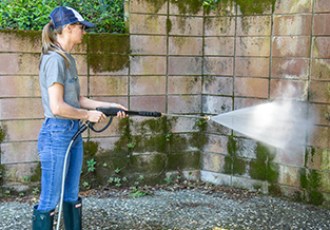
From a handful of basil leaves on a pizza margherita to a sprinkle of chopped cilantro on top of a taco, fresh herbs can truly elevate your culinary game and turn a basic dish into something special. Keeping your own indoor herb garden lets you have fresh herbs on hand at all times – no need to rush to the store at the last minute because you left parsley off your shopping list!
While you could start out with a few pots, some soil, and some seeds, a dedicated indoor herb garden or a full starter kit can help get the ball rolling, especially if you're not sure where to begin. Even then, you'll find a wide range of options out there, which can be baffling. Need some help picking an indoor herb garden? You're in the right place!
Not only have we created a list of our favorites, we've written a detailed guide to indoor herb gardens to help you cultivate your green thumb.

Indoor herb planters
Indoor herb planters are pots, tubs, or other containers in which to grow your indoor herb garden. This is a great choice if you have a sunny windowsill to grow your herbs on and already have soil and seeds ready to go.
Indoor herb garden starter kits
If you're starting completely from scratch, an indoor herb garden starter kit is the way to go. These kits contain everything you need to grow your herbs – seeds, soil, and pots or seed trays. Since the pots included are generally starter pots, you may want to buy larger, more attractive planters to transplant your herbs into once they've grown a few inches.
LED indoor herb gardens
Although herbs are fairly easy to grow, it can still be ticky for beginners, especially if you don't have enough light in the area you'd like to place your herbs. LED indoor herb gardens are a full setup, complete with LED grow lights, making herb growing a breeze. These LED herb gardens may be hydroponic or use soil. They often, but not always, have seeds included.
Growing medium
Plants tend to be grown in soil, but that's not the only option for your indoor herb garden.
Some LED herb gardens are hydroponic, so your plants grow in water, rather than soil. This is less messy and also more hygenic if growing herbs in the kitchen, as cross contamination from soil can be harmful should you consume it. Hydroponic systems give a great yield more quickly, but can produce less flavorful herbs, unless you use a quality nutrient mix.
You can also grow herbs in alternatives to soil, such as coconut coir or any one of a range of soilless mixes. Of course, there's nothing wrong with using trusty soil or potting mixes, either.
Lighting options
We've talked briefly about LED indoor herb gardens, but let's go into more detail on the subject. Indoor herb gardens with built-in lighting generally feature full-spectrum lighting, which mimics the effects of sunlight, so that your herbs can photosynthesize and grow. Choosing an indoor herb garden with lighting is an excellent idea if you just don't have enough natural light to grow your herbs.
If you don't opt for built-in LED lighting, you'll need to position your herbs on a sunny windowsill. Ideally, your herbs should receive at least 4 to 6 hours of direct sunlight each day, but more is preferable, especially for growing Mediterranean herbs, such as basil.
Controls
If you've opted for an LED herb garden, you'll need to consider the controls. The simplest models feature an on/off switch for the LED lights, whereas the most sophisticated allow you to set the lights on a timer, have screens that tell you when to water, when to add nutrients, and more handy growing advice, and may even let you control the system via a mobile app. Whether you want a super high-tech model or something simpler is down to personal preference.
Size and capacity
Check the overall dimensions of your chosen indoor herb garden, in addition to its growing capacity. The overall measurements will tell you whether your herb garden will fit in the spot you've chosen for it. If it's too deep to fit on your windowsill, for example, it won't be much use to you.
Generally, you can grow a single herb in each pot, unless you buy a long trough-style planter, with room to plant several. LED herb gardens usually feature a number of spots with space for a single plant in each one.

Indoor herb gardens vary widely in price, depending on which model you opt for.
Simple indoor herb garden planters or sets of pots can cost anywhere between around $10 and $50, depending on the size, material, and overall quality.
Indoor herb garden starter kits tend to cost between $20 and $40, depending on the number and variety of herb seeds included.
LED indoor herb gardens are by far the most expensive. While you can find some simple models featuring lights and a space to place pots for around $35 to $45, automated hydroponic models start from $100 and can cost as much as $300.
If choosing an herb garden with lights built in, consider the distance between the pots and the lights. Most have limited room for plants to grow, so you must choose which herbs you plant carefully. You can find models with more clearance or with adjustable lighting for growing bigger plants.
Decide whether you want to grow organically. Some starter kits include only organic seeds and soil, whereas others may contain pesticides or non-organic fertilizers.
Give your herbs ample drainage. Many herbs don't like exceptionally moist soil, so check your planters have plenty of drainage holes and don't let pots sit in trays filled with the water that's drained through. Of course, this isn't an issue with hydroponic systems.
You've seen our five favorite indoor herb gardens, but we uncovered more during our research that were extremely close to making the top spots. Any one of them is still worth your consideration. The Click and Grow Smart Garden is a hydroponic option with its own grow lights. It makes growing herbs a breeze, but the main drawback is that you need to use proprietary pre-seeded plant capsules, which is more costly than simply buying seeds. Another excellent self-contained choice is the AeroGarden Harvest, which is a slightly more affordable and less high-tech alternative to the top-of-the-line AeroGarden products. If you'd rather grow your herbs the old-fashioned way, the Spade to Fork Indoor Herb Garden Starter Kit is an all-organic set containing all the pots, soil, and seeds you need to grow parsley, cilantro, basil, thyme, and sage, plus a few extras. We're also huge fans of the Mountain Valley Seed Company’s Culinary Indoor Herb Garden Starter Kit. It contains seeds, soil pucks, seed trays, and more, but you will need to provide larger pots for your herbs down the line.

Q. Where should I position my indoor herb garden?
A. If you choose an LED indoor herb garden, you can place in anywhere, as long as it's within reach of a power socket, because there's no need for natural lighting. Other kinds of herb gardens need ample sunlight to grow, so they should ideally be placed on a windowsill.
Q. What can I grow in an indoor herb garden?
A. You already know you can grow herbs in your indoor herb garden, but you have other options, too. Lettuce and other salad leaves grow well in an indoor herb garden, as do some dwarf tomato varieties.
Q. Are indoor herb gardens easy to set up?
A. The exact method for setting up your indoor herb garden will depend on the variety you choose, but even the most high-tech options are fairly simple to set up if you follow the instructions.
Get emails you’ll love.
Learn about the products you’re wondering if you should buy and get advice on using your latest purchases.
